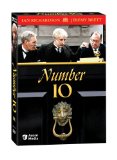| Reviews & Columns |
|
Reviews DVD TV on DVD Blu-ray 4K UHD International DVDs In Theaters Reviews by Studio Video Games Features Collector Series DVDs Easter Egg Database Interviews DVD Talk Radio Feature Articles Columns Anime Talk DVD Savant Horror DVDs The M.O.D. Squad Art House HD Talk Silent DVD
|
DVD Talk Forum |
|
|
| Resources |
|
DVD Price Search Customer Service #'s RCE Info Links |
|
Columns
|
|
|
Number 10
Absolutely fascinating, and with the Brown scandal roiling Great Britain, timely, as well. Acorn Media has released Number 10, a 1983 Yorkshire Television docudrama series written by Terence Feely that looks at the inner workings of Britain's seat of power, Number 10 Downing Street, through the private and political lives of seven of its prime ministers. Prime ministers examined here include William Gladstone, Ramsay MacDonald, David Lloyd George, Arthur Wellesley, the Duke of Wellington, Herbert Henry Asquith, Benjamin Disraeli, and William Pitt the Younger, covering the 1920s back through the Napoleonic wars. Using the same two or three sets representing Number 10 in various states of disrepair and opulence, Number 10's individual episodes don't try to cover the entireties of the prime ministers' lives (each episode runs about 50 minutes), instead focusing on a few important political or personal events that illuminate their characters, their strengths and weaknesses as individuals, as well as their roles as prime ministers. As expected, the performances are superlative, and the writing by Feely intricate and telling. Let's look very briefly at each episode.
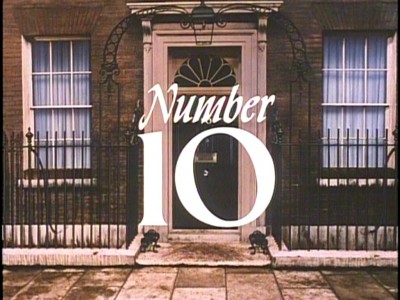
VOLUME ONE
Old Glad Eyes
"Refusing the protection of a personal bodyguard, William Gladstone habitually disappears into the murkier corners of 1880s London. There he seeks out the fallen women of the capital. Is he guided by Christian principles and reforming zeal? Or does he have more earthbound motives?" - slimcase text
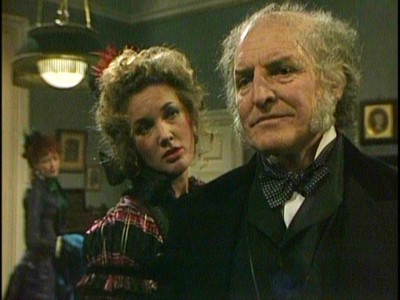
It's going to get a little repetitive writing that "so-and-so was terrific as Prime Minister (fill in the blank)," but it is the case in Number 10 that all the lead actors are quite compelling in their roles, as is Denis Quilley as "Old Glad Eyes" Gladstone. His eyes burning bright with both religious fervor and barely suppressed lust, his fringy halo of white hair surrounding his strong hawk-like face, Quilley looks like a fire-and-brimstone preacher about to pound a Bible, until his voice goes quiet as he contemplates the dichotomy of his passions and his religious beliefs. Taking place in 1882, with the 72-year-old Gladstone "fading fast," scripter Feely uses the hook of potential scullery maid Susan (Juliet Waley) freaking out when Gladstone brings home two whores to have cake and tea and sing Rock of Ages with his wife, Catherine (played wonderfully by Celia Johnson, in her final performance before her death that year), to orient the viewer to Gladstone's rather unusual routine of nocturnal walks into London's lower depths. Working for the Church Penitentiary Association for the Reclamation of Fallen Women, Gladstone's ministry efforts were met with shock and horror by his inner circle who feared the fall-out should his routine become known to the public. Feely also dramatizes the seemingly never-ending "Troubles" with Irish home rule, creating a memorable moment when Gladstone's nephew, Lord Cavendish (Sebastian Breaks) is singing Drink To Me, Only at Number 10, only to have his face freeze as the image of Cavendish butchered body lying in Phoenix Park, Dublin, is superimposed (I love Quilley's delivery of, "Explosions, Mr. Vincent, are the drums behind the symphony of British history. We are singularly unmoved by loud noises."). And there's a fascinating denouement, where Gladstone admits his tortured, "volcanic desires" to his son, Reverend Stephen Gladstone (John Cater), describing his barely-contained lusts, his desire for pornography, and his early self-scourging that eventually had to be stopped, as he crossed the line into enjoying the pain as pleasure. It's a remarkable turn by Quilley, full of terror and wonder, and it starts off Number 10 well.
Underdog
"Britain gets its first Labour Party prime minister in 1924. Ramsay MacDonald is a Scot of humble origins, which the establishment never lets him forget. During a Red scare, MacDonald discovers the lengths to which his enemies will go to bring him down." - slimcase text
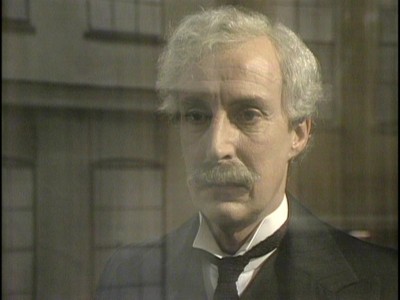
Heading up the first Labour government in Britain's history, Underdog's Ramsay MacDonald (Ian Richardson) is a dour, mournful Scot who doesn't have enough money to furnish the threadbare Number 10, let alone hire servants or buy linens and crockery. A former schoolteacher and clerk, the widowed father of three daughters sums up his situation as the most powerful man in England, without a penny to his name with, "That's why there's been three generations of Tory governments: nobody else could afford to be P.M." Still grieving for his dead wife, MacDonald won't show that soft side of himself to anyone but his daughter, particularly since his political enemies have the knives out for him almost from the start of his term. Scripter Feely has a chance here to dwell a bit on the inherent ironies of the first socialist P.M.'s battles with the government for finer furnishings for Number 10, or more importantly, the more intricate workings of the scandal that involved MacDonald's rewarding his friend, Alexander Grant (Robert Urquhart) a barony in exchange for 40,000 pounds worth of stock in Grant's company. However, these issues are presented more matter-of-factly rather than as potentially ripe subjects of exploration. Still, through Richardson's proud, obstinate performance, we get a feel of the "outsider" tenuousness of his position as the first Labour P.M., as well as the sadness that overtakes him when he realizes his deceased wife, whom he credits for training him in all aspects of his life, didn't teach him "guile, mendacity and deceit," which he now realizes he needs more than his own lofty ideals. Richardson, always such a crafty, watchful actor, has a terrific moment where he attacks one of his loyal supporters, indignantly asserting his humble origins when questioned about forgetting those roots: "Aye, MacDonald of Lossiemouth. I'm your man. Bastard son of an itinerant cowman and a serving maid, born and bred in a two-room shack next to the stables, with 6-inch cracks between the walls to let in the stink of horseshit and horse piss! Here! Here's my birth certificate! I carry it with me just in case I'm ever tempted to forget who I am! So don't you talk to me, you little feather-bedded, bloody Sassenach!" It's a powerful scene, filled with a lower-class anger and passion that won't be seen in the other episodes of Number 10.
A Woman of Style
"World War I leader David Lloyd George faces a bloody war of attrition in Flanders and a submarine campaign that threatens to starve Britain into submission. But the Welsh Wizard knows he is battling English middle-class values as much as the German military. When a crisis arises within his own household, it may be more than even he can surmount." - slimcase text
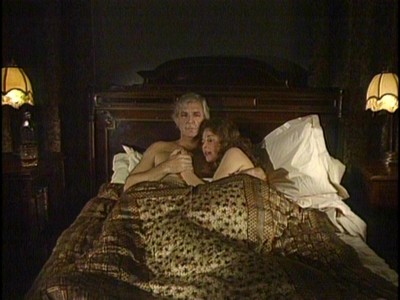
Beautifully structured, alternating Liberal P.M. David Lloyd George's (John Stride) battles with England's military command during WWI and his fulfilling (and destructive) affair with his secretary, Frances Stevenson (Barbara Kellerman), A Woman of Style is one of the tightest episodes in the Number 10 series, with scenarist Feely able to capture not only the overwhelming erotic passion that George felt for Stevenson, but also the genuine outrage that George's loyal, loving wife, Lady Margaret Lloyd George (Rhoda Lewis), felt at his betrayal. As P.M., George's position in regards to calling the shots over the advice of career military officers, is limited by tradition, something that sticks in his craw when he sees a military that refuses to update its tactics. Not only is the English Imperial Navy refusing to protect the merchant ships that are getting slaughtered by the German U-boat packs (even going so far as to fudge a report to trick George into thinking there aren't enough Navy ships to cover an inflated merchant navy), but his own Army commander, General Douglas Haig, is instituting a merciless "end game" strategy of attrition to win the war, equating the deaths of hundreds of thousands of soldiers to mere numbers on a slate.
Inbetween these meetings that could decide the fate of England, George is "openly" conducting an affair with his Welsh secretary (everyone knew, considering they were often caught fumbling with each other behind closed doors) - much to the chagrin of his long-suffering wife. She is the "woman of style" the title refers to, a term rightfully given when scripter Feely gives her a stunning rebuke of George's lifelong infidelities. Lamenting that she always loved and supported him, she now tells him he's a "pig" for treating her no better than one of their dogs. Forever loyal to him (she frequently propped up his political fortunes in his native Wales), she decries his cavalier dismissal of her works on his behalf, while informing him he's also lost the love of his children, who now hate him, because of his behavior. George, realizing with sickening certainty that's she's right, tries to bluster, "For God's sake, Meg! I made you a wife of the prime minister of the United Kingdom!" to which she coldly and regretfully replies, "Yes. But you didn't make me yours," which devastates George. Stride, whom I remember from small parts in Brannigan, The Omen, and A Bridge Too Far, hits just the right note as the passionate but criminally shortsighted (in terms of his relationship with his wife) P.M., while Rhoda Lewis (a veteran of countless British productions) is quietly impressive as the wronged Lady Margaret. Again, beautifully structured.
VOLUME TWO
The Iron Duke
"War hero and scourge of Napoleon, Arthur Wellesley, Duke of Wellington, becomes Britain's new peacetime prime minister. While the Iron Duke dismisses the murderous threats of his estranged nephew, he fears the issue of Catholic emancipation will be his real Waterloo." - slimcase text
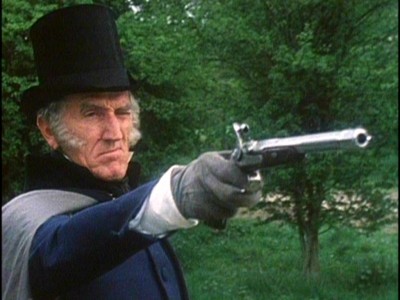
Set in 1828 during his first brief run as Prime Minister (he only sat for 2 years, and then again for only three weeks in 1834 as interim P.M. while Robert Peel was away from England), The Iron Duke is an interesting look at Arthur Wellesley (Bernard Archard), the first Duke of Wellington who was catapulted into the P.M. slot for the Tories after his dazzling military escapades captured the British public's imagination. Portrayed here as a shrewd military man reluctant to accept his political appointment except as a fulfillment to his King, George IV (David King), Wellington's popularity is immediately challenged on two fronts. First, his nephew, William Long-Wellesley (Gawn Grainger), is homicidal in his pursuit of Wellington, owing to the Duke's custody of Long-Wellesley's children. Seeking to ruin the Duke reputation with the public, Long-Wellesley states in a publication that Wellington is enjoying a deviant relationship with his married friends, Charles and Harriet Arbuthnot (Philip Latham and Gabrielle Drake). Doing far greater damage to Wellington's standing with the British people is his eventual reversal on the question of Catholic emancipation. An anti-reformist who believes democracy should be squashed, having given rise to Napoleon and the Terror ("The common man is best off in the hands of his betters."), Wellington's military pragmatism comes into play when Irishman Daniel O'Connell is elected (illegally) into Parliament, bringing with him the inevitable march towards civil war with Ireland should England resist the call for emancipation for the Catholics ("Any damn fool can stand and be cut to pieces."). Wellington, shown as a man of contradictions (a supremely-gifted warrior who loved nothing more than a house full of noisy children with whom he could have a pillow fight; an aristocrat who still slept on an army camp bed), understands that his weak, whimpering King will be unable to meet the demands that will arise should civil war break out, and therefore offers his resignation to buckle the King's will to fight emancipation. It succeeds, but ruins Wellington's standing with the overwhelmingly Protestant public, who view him as a traitor. After his duel with his nephew to assuage honor and settle their differences, Wellington is again the most popular man in England, to which he ruefully replies, "This week." Presented in as straightforward a manner as one might believe Wellington was in real life (or at least outwardly in his military bearing), this particular episode hangs or falls on the lead performer, and Archard is perfection as the seemingly no-nonsense but surprisingly complex Wellington. His duel scene with his nephew is expertly handled, bringing real suspense to this reviewer who was ignorant of the outcome of this historical event. Another concise episode from scripter Feely.
The Asquiths
"In 1908, Herbert Henry Asquith moves into No. 10 from the chancellor's residence next door and faces a Commons-versus-Lords battle of historic proportions. Outside Downing Street, suffragettes chain themselves to the railings and demand the vote. Inside, an already liberated Mrs. Asquith exercises her freedoms with abandon." - slimcase text
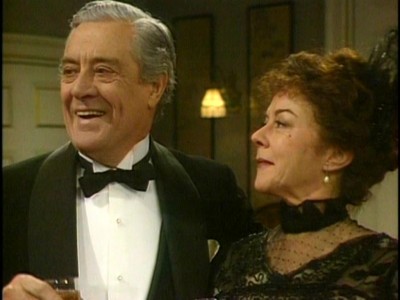
The least successful episode in the Number 10 series, The Asquiths follows Liberal P.M. Herbert Henry Asquith's (David Langton) efforts to get his reform-minded "People's Budget" past the obstinate House of Lords. Asquith, born into the middle-class, counts the aristocracy among his friends, as does his free-spirited, suffragette wife, Margot (Dorothy Tutin). Asquith, dedicated to breaking the aristocratic House of Lords veto power over any Liberal reform bills, rationalizes this dichotomy of feeling towards the gentry by stating that although he and his wife personally enjoy their company, politically, the gentry are "an abomination." Eventually, after the Lords, in an unprecedented move, stop a budget bill from being passed, Asquith persuades King Edward VII (Wensley Pithey) to promise to create 100 new Liberal peers to stack the House of Lords and thereby end their dominance over the government, a move the King resists at first, putting it off until another general election could be held. Eventually, the Parliament Act of 1911 defeated the House of Lords, stripping away their power to defeat outright a bill that had passed first in the House of Commons. And while all of this political maneuvering is interesting to watch (if you know a little bit of English parliamentary history), scenarist Feely's subplot involving Margot, Herbert and the suffragettes who protest outside Number 10, is diffused and unfocused, with little point made from its inclusion here. Why not explore more fully Asquith's love/hate relationship with the aristocracy? Why not illuminate more clearly his wife's eccentricities? It's the only episode in Number 10 that didn't achieve a balance between illuminating the political and the personal life of the prime minister - a missed opportunity.
VOLUME THREE
Dizzy
"Raised a Christian but born a Jew, Benjamin Disraeli has always felt like an outsider. Prime minister late in life, he struggles to keep Russian ambitions in the eastern Mediterranean in check. He also contends with his own passion for three women - one married, one a widow, and one at the very highest levels of Victorian society." - slimcase text
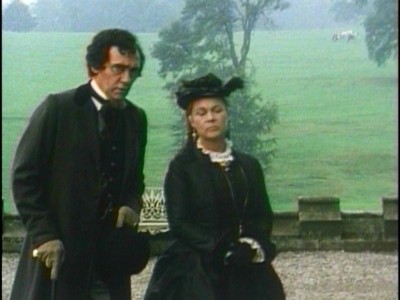
Set in 1876 during Benjamin Disraeli's (Richard Pasco) second run as Prime Minister, Dizzy juggles the political tribulations that plagued the aging, ailing Disraeli during his government, with the personal romantic obsessions he suffered/encouraged/reveled in with various unattainable married women of nobility. His greatest political threat at this point came from the Russian bear's expansionist policies, a menace that threatened Turkey and which required the utmost tactical skill on his part to thwart - without bringing England into war. Certainly, Disraeli's extremely close relationship with his Queen, Victoria (Zena Walker) gave political stability to his policies (particularly in the face of opposition by Gladstone), but it also provided a romantic subtext to his relentless, sometimes scattershot pursuits of married aristocrats. Lady Selena Bradford (Elizabeth Sellars) becomes increasingly frustrated with Disraeli's overbearing pursuit of her, particularly as her husband was counted among Disraeli's close friends. Bombarding her with unasked-for, unwanted visits and little love notes, she finally relents, allowing him the pleasure of giving her one of his treasured golden bee pins. But for Disraeli, at least in Feely's script, the constant pursuit of idealized, romantic love with an older woman of aristocracy is far more important to Disraeli than actually consummating such a relationship, so other women fall under his assaults, as well, culminating in his most savored victory: a request for a golden bee pin from Victoria herself. Having earlier reviewed an excellent BBC mini based on Disraeli's life (with Ian McShane doing wonders with the character), this necessarily truncated snippet of Disraeli's life suffered by comparison (if one is looking for a complete picture of the politician's life), but it was quite good at getting across the curious romantic obsessions Disraeli had during his later years. What fueled those pursuits is subject to interpretation, but here, it seems Feely is getting at them as a way of highlighting Disraeli's fear of getting older and sick right when he's reached the pinnacle of power, as if it's too late to be an effective P.M.. Disraeli, a passionate booster of English imperialism ("I am not ashamed of the noblest of human sentiments, now derided by philosophers: the sentiment of patriotism."), executes a remarkably "adroit" maneuvering around the Russians, a political act that should have brought him great satisfaction, but one that had little meaning without the corresponding knowledge that he held the attentions of several women ("Fame without a woman is ashes in the mouth."). Pasco is excellent at showing Disraeli rousing himself from increasing infirmity ("Lord, I know that suffering is a mark of thy love, but just once, wouldn't a headache do?") to slather buttery flattery on the noblewoman who happens to be in his sights. It's a tough performance to get right (weak physically but indomitable in romantic fancy), but Pasco does it admirably here.
Bloodline
"Rigorously groomed for leadership since boyhood, William Pitt the Younger has given his very lifeblood in the service of his country. But the prime minister hides a dark secret. More terrifying to him than the Napoleonic armies massing across the Channel is the Pitt family curse, which threatens to destroy him and drive away the woman he loves." - slimcase text
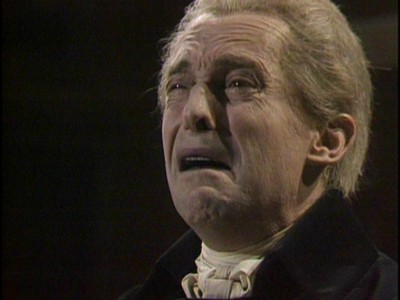
The least political and the most romantic of all the episodes included in Number 10, Bloodline tells the story of William Pitt the Younger's (Jeremy Brett) continual battle with insanity, a condition he dampers with drink, but one which holds him to a sacred promise to his equally mad father, the Second Earl of Chatham (Keith Barron), to never have children. Falling hopelessly in love with the beautiful Eleanor Eden (the equally gorgeous Caroline Langrishe), Pitt finds a measure of stability in his personal life as he battles foes such as Charles James Fox (David Ryall) who wish to derail Pitt's tax plan to wage war against Napoleon. However, Eleanor's youth becomes a political issue, one which Pitt might have ignored if his own brief bouts of madness didn't convince him that a relationship with Eleanor must end ("How could I ever forgive myself if she were to bear...mad things for children?"). From what I understand, there's never been a definitive reading on why Pitt didn't pursue a relationship with Eleanor. If this take on Pitt's "madness" is entirely fictional, I wouldn't know that, either, not having read any biographies on Pitt. Factual or fictional, Bloodline is certainly the most dramatic of the episodes included in Number 10, with Jeremy Brett giving a stunning performance of a gifted politician tortured by the knowledge that at times, he won't be in total control of himself. As well, that loss of control robs from him the one true love of his life, Eleanor, and according to Feely, he won't allow himself even the solace of explaining to her why, instead letting her think he's dropping her for political reasons (her young age and the resulting scandal). Langrishe has a marvelous, playful chemistry with Brett, which makes their tragic parting have that much more impact, regardless of whether or not these events are factual.
The DVD:
The Video:
Acorn Media has their standard disclaimer on the back of the box for Number 10, warning the viewer about the age of the original materials (i.e.: the crappy video look of most English television from this time period). But taking that into consideration, the full screen, 1.33:1 image for Number 10 isn't too bad if you're accustomed to the look of these kinds of British TV productions (and I would imagine most people interested in this series have had that experience). Colors are washed out to a certain extent, and video noise is apparent. The image can be soft at times, as well. But again, visual splendor isn't the point of a series like Number 10; it's the writing and the performances. So a less-than-optimal look (due to the original materials, not Acorn Media) won't matter here.
The Audio:
The English mono audio track may be a little squelchy at times, but it's adequate for the job here, with all dialogue heard. Fortunately, English subtitles are included, as well, for those who have trouble with the accents.
The Extras:
I recommend that you check out the text bios of each individual prime minister, included here on the discs, before watching the individual episodes, particularly if you're a little shaky on the history involved, and you don't remember who was a Tory or a Liberal (uh...that would be me).
Final Thoughts:
A thoroughly fascinating series of episodes, chronicling the lives of various English Prime Ministers, Number 10 is must-viewing for those who love British docudrama TV. Stellar performances right down the line, and some expertly-crafted, informative, and sometimes even moving screenplays by writer Terence Feely mark 1983's Number 10 one of the best DVD sets I've seen this year. I highly, highly recommend Number 10.
Paul Mavis is an internationally published film and television historian, a member of the Online Film Critics Society, and the author of The Espionage Filmography.


|
| Popular Reviews |
| Sponsored Links |
|
|
| Sponsored Links |
|
|
| Release List | Reviews | Shop | Newsletter | Forum | DVD Giveaways | Blu-Ray | Advertise |
|
Copyright 2024 DVDTalk.com All Rights Reserved. Legal Info, Privacy Policy, Terms of Use,
Manage Preferences,
Your Privacy Choices | |||||||









